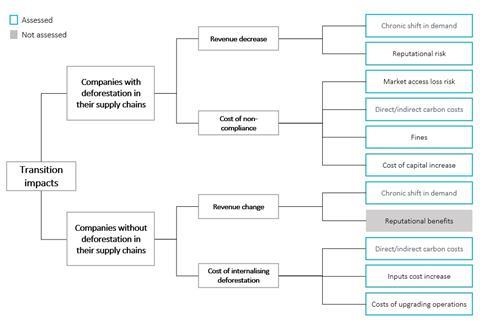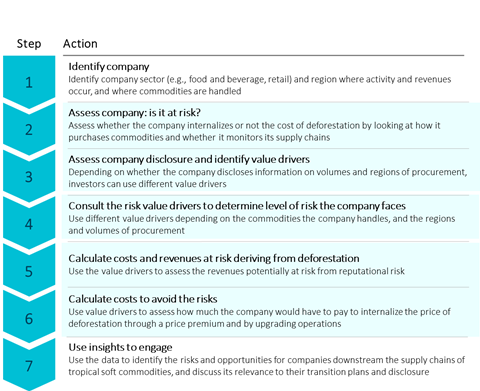The new IPR supply chain analysis enables better climate risk analysis of tropical commodity supply chains by estimating value drivers and linking those to company exposure.
This IPR module maps regulatory drivers and estimates production, prices and trade flows of tropical soft commodities that create value and risk in the supply chain and develops a method for quantifying risk exposure that can be applied to individual downstream companies
Why is this supply chain analysis needed?
- Tropical soft commodities (e.g., beef, soybean, palm oil, timber, coffee, rubber, cocoa) drive a disproportionate share of deforestation, creating transition risks for downstream companies
- Supply chains of tropical soft commodities are reliant on international trade, so upstream deforestation in a few jurisdictions drive direct and indirect risks to investors in downstream companies globally
- The ‘inevitable policy response’ would tackle deforestation in most jurisdictions exacerbating risks for companies and investors
- There is increased pressure for companies to disclose the environmental impacts of their supply chains and stress tests their strategies using scenario analysis
- To date, there is no set of scenarios andvalue drivers applicable to companies operating downstream the supply in the land-use sector
What this analysis provides investors with:
- Information on the policy landscape regulating production and trade of tropical soft commodities and its implications on downstream companies’
- Production, prices and value drivers of tropical soft commodities at the regional level across different scenarios
- A risk analysis framework and metrics to understand and assess transition risk related to deforestation driven by production of tropical soft commodities
Upstream companies have strong opportunities to protect value through altering operations and increasing efficiency to avoid increased policy-related costs. They may also be able to pass costs down the value chain
Downstream companies have tight margins but could protect value by offering sustainable and certified products to safeguard their reputations. They also face the difficult choice of absorbing increases in costs or passing them on to consumers in a time of already high inflation
The policy response on deforestation could substantially impact tropical soft commodities which are part of key global supply chains, such as timber and beef
IPR has developed a new framework helping investors understand supply chain risks driven by the transition
- The proposed framework aims at supporting investors identify the key impacts associated with future transitions and deforestation and leverages existing research to assess the most relevant variables and indicators investors may consider

Note: The framework covers only risks and costs, not benefits, as those related to Nature-based solutions are covered in the existing value drivers. Reputation benefits not accounted for in a prudential manner. Additionally, chronic changes in demand and carbon costs are already captured in the existing value drivers.
How can it be implemented? When region and volumes of procurement are known, regional value drivers can be used

Downloads
IPR Supply Chain Analysis
PDF, Size 2.19 mbIPR Supply Chain Analysis Value drivers
Other, Size 0.32 mb











